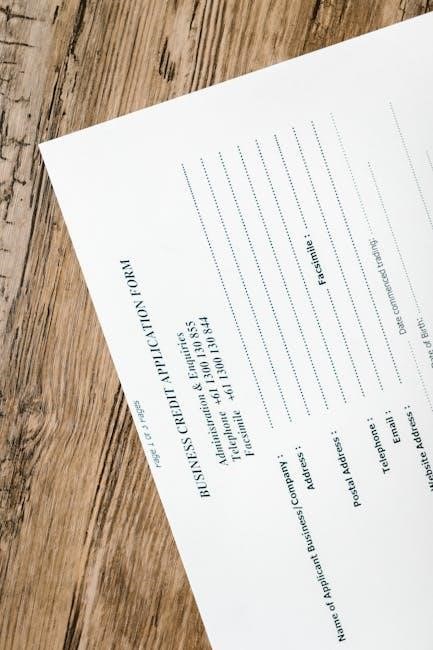Overview of Alabama Form 40A
Alabama Form 40A is the state income tax return for residents, non-residents, and part-year residents․ It is used to report income, claim deductions, and calculate tax owed or refunds․ The form is essential for filing individual state taxes and must be accompanied by supporting documentation and instructions for accurate completion․
1․1 What is Alabama Form 40A?
Alabama Form 40A is the official state income tax form used by residents, non-residents, and part-year residents to report their income․ It is designed for individuals to calculate their tax liability, claim deductions, and receive refunds․ The form requires detailed financial information and must be filed annually with the Alabama Department of Revenue․ Accurate completion ensures compliance with state tax regulations․
1․2 Who Should Use Form 40A?
Alabama Form 40A is required for residents, non-residents with Alabama income, and part-year residents․ Individuals with income exceeding state thresholds must file․ It applies to those reporting wages, self-employment, or other taxable income․ The form is for personal income tax returns, not business entities․ Filing status and residency determine eligibility, ensuring compliance with Alabama tax laws․ Proper completion is essential for accurate tax calculation and refund processing․
1․3 Where to Find Form 40A and Its Instructions?
Alabama Form 40A and its instructions can be found on the official Alabama Department of Revenue website at www․revenue․alabama․gov․ The form is also available through tax preparation software like TurboTax or H&R Block․ Additionally, you can request a physical copy by visiting a local library or tax office․ Ensure you use the most recent version for accurate filing․

Eligibility Criteria and Filing Requirements
Eligibility to file Alabama Form 40A depends on gross income and residency status․ Residents, non-residents, and part-year residents must meet specific income thresholds based on filing status․
2․1 Income Thresholds for Filing
Income thresholds determine whether Alabama residents, non-residents, or part-year residents must file Form 40A․ These thresholds vary based on residency status and filing status․ Residents must file if their gross income meets or exceeds the specified amount for their filing status․ Non-residents must file if they earn income from Alabama sources above the threshold․ Check the Alabama Department of Revenue guidelines for exact figures to ensure compliance with state tax laws․
2․2 Residency Status and Filing Requirements
Residency status determines filing requirements for Alabama Form 40A․ Full-year residents must report all income, while non-residents only report income earned in Alabama․ Part-year residents report income from both residency and non-residency periods․ Correctly identifying residency status is crucial to avoid errors or penalties․ The Alabama Department of Revenue provides guidelines to help individuals determine their residency status and filing obligations accurately․

Necessary Documents and Information
Gather W-2s, 1099s, and other income statements․ Ensure you have personal details like Social Security numbers and accurate financial data for deductions and credits․
3․1 Required Personal and Financial Information
Provide Social Security numbers for yourself, spouse, and dependents․ Include accurate income details from W-2s, 1099s, and other sources․ List deductions, credits, and any relevant financial data․ Ensure all information matches official documents to avoid errors․
3․2 Supporting Tax Documents Needed
Gather W-2s, 1099s, and other income statements․ Include receipts for deductions like medical expenses, charitable contributions, and education costs․ Attach Schedule A for itemized deductions and Schedule D for capital gains․ Ensure all documents are valid and legible to support your return and prevent delays in processing․
Filing Status and Dependencies
Filing status options include single, married filing jointly, married filing separately, head of household, and qualifying widow(er)․ Accurately claim dependents to ensure proper tax calculations and avoid discrepancies․
4․1 Understanding Filing Status Options
Alabama Form 40A requires selecting the correct filing status, such as single, married filing jointly, married filing separately, head of household, or qualifying widow(er)․ Each status has specific criteria, including marital status, household ownership, and dependent qualifications․ Accurately choosing the filing status ensures proper tax calculations, deductions, and credits, avoiding potential errors or delays in processing your return․ Always review eligibility requirements carefully․
4․2 Claiming Dependents on Form 40A
Claiming dependents on Alabama Form 40A reduces your taxable income, lowering your tax liability․ Dependents include qualifying children, relatives, or others who meet specific criteria․ You must provide their Social Security number, relationship, and residency details․ Ensure dependents meet IRS and Alabama-specific guidelines to avoid errors․ Proper documentation and eligibility verification are crucial for accurate processing of your return․ Always review dependent requirements carefully before filing․

Income Types and Calculations
Alabama Form 40A requires reporting all taxable income, including wages, self-employment, retirement, and investment income․ Calculate total income by summing all sources and applying applicable adjustments․
5․1 Types of Income to Report
Alabama Form 40A requires reporting various types of income, including wages from W-2s, self-employment income, retirement benefits, unemployment compensation, and investment income like dividends and interest․ Additionally, income from rental properties, royalties, and any other taxable sources must be included․ Ensure all income sources are accurately listed to determine total taxable income for the year․
5․2 Calculating Total Income and Adjustments
To calculate total income and adjustments for Alabama Form 40A, start by gathering documents like W-2s, 1099s, and investment statements․ Sum all income sources, including wages, self-employment earnings, investments, and retirement benefits․ Next, identify eligible adjustments such as student loan interest, alimony, and retirement contributions, subtracting them from total income․ Finally, apply any applicable deductions or exemptions to arrive at your adjusted gross income, ensuring accuracy to comply with state tax requirements and optimize your refund․
Deductions and Credits
Deductions reduce taxable income, while credits lower tax liability directly․ Alabama provides standard deductions, itemized deductions, and specific credits for education, childcare, and other qualified expenses annually․
6․1 Standard Deductions vs․ Itemized Deductions
Alabama Form 40A allows taxpayers to choose between standard deductions and itemized deductions․ Standard deductions offer a fixed amount based on filing status, while itemized deductions permit taxpayers to list specific expenses like medical costs, mortgage interest, and charitable contributions․ Itemized deductions are beneficial when total expenses exceed the standard deduction amount, optimizing tax savings for eligible filers annually․
6․2 Available Tax Credits for Alabama Residents
Alabama residents can claim various tax credits on Form 40A to reduce their tax liability․ Common credits include the Earned Income Tax Credit (EITC), Alabama State Income Tax Credit, and Child and Dependent Care Credit․ Additionally, education-related credits and credits for certain retirement contributions may apply․ These credits can significantly lower taxable income or increase refunds, provided eligibility requirements are met and proper documentation is submitted․

Filing Methods and Submission
Alabama Form 40A can be filed electronically or by mail․ E-filing is faster and reduces errors, while paper filing requires mailing a signed return to the correct address․
7․1 E-Filing vs․ Paper Filing
E-filing is faster and more convenient, reducing errors and processing time․ It offers instant confirmation and quicker refunds․ Paper filing requires mailing a signed return, which takes longer to process․ Choose e-filing for efficiency and accuracy, or opt for paper filing if preferred, ensuring correct mailing addresses to avoid delays․
7․2 Mailing Instructions for Paper Returns
When mailing a paper return, use a sturdy envelope and ensure handwriting is legible․ Include the signed Form 40A, payment vouchers, and all required documentation․ Use correct postage and verify the mailing address on the Alabama Department of Revenue’s website or instructions․ Check for any special handling instructions, especially for overnight or express deliveries․ Include a return address for potential correspondence․

Deadlines and Extensions
Alabama Form 40A must be filed by April 15th for most tax years․ Extensions can be requested using Form 40-EXT, granting an additional six months to October 15th․
8․1 Tax Filing Deadline in Alabama
The deadline for filing Alabama Form 40A is typically April 15th of each year․ Missing this deadline may result in penalties and interest on the unpaid tax․ Extensions can be requested, but any owed taxes should still be paid by the original deadline to avoid penalties․ Ensure timely submission to comply with state tax regulations․
8․2 How to Request an Extension
To request an extension for filing Alabama Form 40A, you can e-file or mail Form AL 221 by the original deadline․ Alabama grants an automatic six-month extension for filing, but taxes must still be paid by the original due date to avoid penalties․ Include the extension form with your return and ensure timely submission to meet state tax requirements․

Payment Options and Refund Information
Alabama Form 40A allows e-filing with payment options like electronic checks or credit cards․ Refunds can be direct-deposited or mailed․ Ensure accurate bank details for timely processing․
9․1 Methods for Paying State Taxes
Alabama residents can pay state taxes via electronic check, credit card, or paper check․ E-payments are processed through the state’s e-file system, offering convenience and speed․ For paper filings, checks must be made payable to the Alabama Department of Revenue, with the taxpayer’s name, Social Security number, and tax year included․ Ensure accurate payment information to avoid delays in processing․
9․2 How to Claim a Refund
To claim a refund, ensure Alabama Form 40A is accurately completed․ If e-filing, the refund option is selected during submission․ For paper filings, mail the form with required documentation․ Refunds are issued via direct deposit or check․ Verify all personal and financial details to avoid delays․ The Alabama Department of Revenue processes refunds, with e-filed returns typically yielding faster results․

Common Mistakes to Avoid
Common errors include incorrect personal information, missed deadlines, and omitted income or deductions․ Always double-check calculations and verify all details before filing to ensure accuracy and compliance․
10․1 Errors in Personal Information
Ensure all personal details, such as name, Social Security number, and address, are accurate․ Mismatched information can delay processing or lead to rejection․ Double-check spellings and numbers to avoid errors․ Correct any discrepancies before submission to prevent issues with the Alabama Department of Revenue․ Accuracy in personal information is crucial for a smooth filing process․
10․2 Omission of Income or Deductions
Failing to report all income or claim eligible deductions can lead to an inaccurate tax return․ Ensure all sources of income, including wages, self-employment, and investments, are included․ Similarly, review all possible deductions and credits, such as education or child care expenses, to maximize your refund․ Omissions can result in delays, penalties, or even an audit․ Double-check your documents for completeness․

Resources and Assistance
Access official Alabama tax forms and instructions on the state government website․ Contact the Alabama Department of Revenue for personalized support or visit local tax assistance centers for free help․
11․1 Contacting the Alabama Department of Revenue
The Alabama Department of Revenue provides support for tax-related inquiries․ Visit their official website at www․revenue․alabama․gov for contact information, including phone numbers, email forms, and office locations․ You can reach them for assistance with Form 40A, deductions, or filing status questions․ Their team is available to address concerns and guide you through the tax process effectively․
11․2 Free Tax Filing Assistance Programs
Alabama offers free tax filing assistance through programs like the Volunteer Income Tax Assistance (VITA) and Tax Counseling for the Elderly (TCE)․ These programs provide free help to low-income individuals, seniors, and those with disabilities․ Visit the Alabama Department of Revenue’s website or local community centers to find participating locations and eligibility criteria․ These services ensure accurate filing of Form 40A and maximize refunds․
Alabama Form 40A is essential for state income tax filing․ Ensure accurate information, organize documents, and consider e-filing for efficiency․ Seek assistance if needed for a smooth process․
12․1 Summary of Key Points
Alabama Form 40A is crucial for state tax compliance․ Key points include understanding eligibility, gathering necessary documents, selecting the correct filing status, and accurately reporting income․ Properly claiming deductions and credits can minimize tax liability․ Timely filing and utilizing available resources ensure a seamless process, avoiding common errors like omissions or incorrect information․
12․2 Best Practices for a Smooth Filing Process
Gather all necessary documents and information beforehand to avoid delays․ Double-check the form for accuracy, ensuring all personal and financial details are correct․ Understand your filing status and dependencies to claim them properly․ Stay informed about tax law changes and deadlines to ensure compliance․ Seek assistance from official resources or tax professionals if needed for a hassle-free experience․



